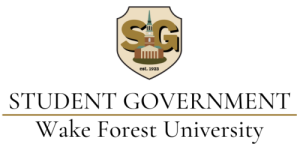University prepares for COVID-19 vaccine
As the semester comes to a close, the university is offering voluntary asymptomatic testing
November 12, 2020
Following biopharmaceutical company Pfizer’s announcement of a 90% effective vaccine on Nov. 9, the focus around the country has been slowly shifting to distribution efforts for when the potential COVID-19 vaccine arrives. According to Student Health Service Director Dr. Cecil Price, these efforts are well underway at Wake Forest. Price explained that the university has assembled a group that meets every two weeks, made up of administrators, that discusses the university’s vaccine release plans when one becomes available.
“We have no idea when the vaccine will be available, but we are discussing logistics about how to administer the vaccine to everyone, faculty and staff included,” Price said.
The group that meets to discuss vaccine release has “interaction with the county health department and state emergency management.” Logistics such as the necessity of adding infrastructure to handle the vaccine like purchasing freezers, should the vaccine need to be frozen, have also been discussed.
“The Dean of Students Office put together the flu vaccine clinic, so we have experience with this. We are working on this as part of the university’s plan to address COVID-19,” Price said. “The Pfizer info is very good info … and 90% effective is very very good, speaking as a clinician. That number could make a big difference in people getting the vaccine.”
Rue echoed the planning
“Scaling up production and distribution, and setting priorities for who gets access to a vaccine first, are matters of public policy,” said Vice President for Campus Life Penny Rue. “We are well-positioned to gain access because of our relationship with a major medical center, and if we can, we will definitely want to distribute the vaccine when it becomes available.”
New developemnts on a potential vaccine come as the university prepares for the last week of in-person classes. Most students around campus seem to be proceeding carefully as they prepare to leave campus for two months at the week of Thanksgiving.
On Nov. 5, the university sent out an email to all students notifying them of holiday departure procedures and testing opportunities. It was suggested in the email, though not mandated, that students quarantine in order to protect their friends and family back home. The university will also offer pre-departure testing to allow students to further protect their loved ones at home.
According to Rue, roughly 600 students have signed up for pre-departure testing.
Another point of concern for the Wake Forest community has been the recent onset of COVID-19 cases among staff and contract workers, as reported by the Old Gold Black on Oct. 29. Rue explains that the university submits all employees through the same symptom tracking and testing protocols that are applied to students.
“We require our employees to utilize the SneezSafe symptom tracker and be cleared in order to be able to access campus. We use the same process of contact tracing and quarantine or isolation for those who are exposed or test positive. We will continue to aggregate employee cases as the numbers are small.”
Rue, however, did not indicate whether staff and contract workers will be covered by its weekly random testing efforts.
The COVID-19 dashboard featured a surge in cases for Monday and Tuesday. When asked about this small surge and its potential relationship to Halloween celebrations, Price stated celebrations occurred without any indication of a superspreader event on campus.
“There were not a lot of huge parties, only some small gatherings that could have impacted that [surge],” Price said while also cautioning that he “cannot conclude that the surge is Halloween-related.”
Campus officials have repeatedly stressed the importance of conscientiousness at small gatherings, seeing as those gatherings with fewer people tend to be the ones that cause cases to spike when proper mask-wearing etiquette is not in place.
In addition to small gatherings at Halloween being problematic, Price noted that numbers in Forsyth County have been rising, which may correlate with the slight rise in cases on campus.
“Winston-Salem and Forsyth County had bars and restaurants open,” Price said, “and that affects students.”













